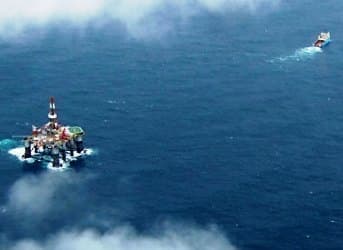While tensions between Britain and Argentina have been rising as a natural response to the 30th anniversary of the Falkland War, oil is the primary driver of a renewed Falkland dispute that will determine the fate of tens of billions of dollars in black gold.
At the same time, while Argentine President Cristina Kirchner and British Prime Minister David Cameron are trading serious barbs over the sovereignty issue, big oil companies are largely ignoring the implications and conducting business as usual.
The Falkand Islands (Islas Malvinas) were reclaimed by the British in June 1982 after a 74-day war in response to an Argentine invasion. Argentina lost 649 troops in the war, while the UK lost 255 troops. The 30th anniversary of this war coincides with some major oil developments, which the UK is hoping to resolve by supporting the Falkland government’s holding of a referendum on its political status in 2013.
Argentina is on the losing end of this battle. Not only will the referendum favor the status quo, but Kirchner’s recent move to nationalize Argentina’s interests in Spain’s Repsol oil company has lost her any support she might have enjoyed (particularly from Spain, France and Italy) over the Falklands issue.
This is exactly what big oil is banking on, and recent months have seen some significant developments that seem to ignore the brewing tensions entirely. Two major discoveries are set to turn the Falklands into a key oil player almost overnight. The first, and less significant, is the 1.3 billion barrel discovery by Rockhopper’s Sea Lion (RKH) in the north Falklands Basin. The second is the 4.7 billion barrel prospect of Loligo, for which FOGL plans to start drilling its first well this month.
The Loligo prospect was boosted by news that came in the first week of June that Edison Spa, an Italian utility bought by France’s EDF in June, will acquire a 25% interest in northern licenses of Falkand Oil & Gas and another 12.5% interest in FOGL’s southern licenses. The significance of the Edison Spa deal is that it will provide FOGL with some much-needed financing to get things under way in Loligo. In return for the licenses, the utility company will fund FOGL’s drilling to the tune of $50 million and hand over another $40 million in cash.
The oil angle to the Falklands dispute gained momentum in 2010 when the UK authorized prospecting, provoking the ire of Argentina. The next major uptick in the ongoing crisis came in December last year, when Rockhopper revealed that its Sea Lion field held more oil than expected. This in turn led to an immediate increase in interest in the Falklands’ offshore oil prospects. The UK moved quickly to ensure the security of these discoveries by sending in naval units, prompting a harsh response from Argentina and escalating the crisis.
But the UK holds most of the cards. Not only will “Falklanders” vote to remain a self-governed overseas territory of the United Kingdom in a referendum, but Spain, Italy and France in particular have no sympathy for Argentina in the aftermath of its decision to nationalize its Repsol interests. Oil exploration is proceeding as if the dispute is resolved.
So with the oil momentum already picking up an irreversible pace, how will the sovereignty dispute be resolved? As far as the UK is concerned, it will not negotiate the issue before the United Nations unless it is asked to do so by the Falklands legislature, which is happy to hold a referendum. The results of the referendum will provide the UK with any ammunition it needs.
Argentina’s only real recourse here is military. We can expect a great deal of bluster on the issue and some high-minded rhetoric recalling British colonialism and the like in the coming weeks, particularly as plans proceed at a fast pace for exploration and drilling. But in the end, this will be toothless bluster designed largely to allow Kirchner to appease a public that has long been taught to view the Falkland Islands as an integral part of Argentina.
The UK might have been willing to decolonize the Falklands, and certainly, it has seriously entertained the notion in the past. But now that the Falkands are set to become a major oil player, the situation is very different. No one wants Argentina to step in and claim the islands with the fear of nationalization fresh on the heels of the Repsol debacle. The bottom line is that Argentina lost the Falklands over Repsol.
By. Charles Kennedy



















In his message to the Argentinian Congress on 1st May 1865 President Mitre said 'there was nothing to prevent consolodation of friendly relations between this country and those governments' (Britain and France). In 1869 Belgium, Italy, the North German Federation all had consulates in Stanley. For the whole of the 1860s, Argentina did not mention the Falklands to Britain.
Argentina's claim to the Falkland Islands has absolutely no legal basis and they have refused the UK's offer to go to the international court on at least occasions.